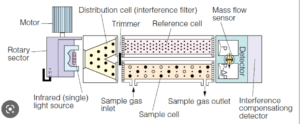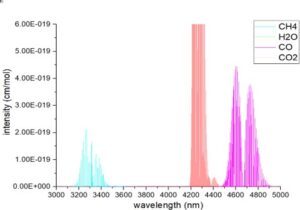Call
WhatsApp
Mail
Introduction
IR-GAS-600 series gas analyzer is an non-dispersive infrared (NDIR) gas analyzer. Moreover, the NDIR gas analyzer independently developed by our company for environmental monitoring and industrial site emission gas analysis. The analyzer mainly measures CO, CO2, CH4 ,N2O and O2 gas concentrations, and has the characteristics of high measurement accuracy, high stability and reliability and fast response time.
This model high-stability infrared detectors for simultaneously measuring CO, CO2, and CH4. H2 always reads correctly, independent of the background gas composition. An optional non-depleting paramagnetic sensor can be used to conduct O2 analysis. All sensors/detectors are temperature-controlled or temperature-compensated for maximum analytical stability.
Both types of analyzers are available with analysis of:
☑ Measure COppm+CO2+CH4ppm+N2Oppm in the one unit
☑ Measure CO%+CO%+CO2%+CH4%+CnHm% in the one unit


GFC series suitable for environmental monitoring and industrial site emission gas analysis
| Item | Specifications |
| CO range(NDIR) | (0~100)mg/m3 |
| CO2 range(NDIR) | (0~25)% |
| CH4range(NDIR) | (0~500)mg/m3 |
| N2O range(NDIR) | (0~100)mg/m3 |
| O2range(ECD) | (0~25)% |
| Stability | Less than 2% |
| Max Flow Rate | 2L/min |
| Zero Drift | ±2%FS(24 hours) |
| Span Drift | ±2%FS(24 hours) |
IR-GAS-600 series suitable for process gas analysis
| INFRARED NDIR DETECTOR | |||||
| GAS | Lowest Range | Highest Range | LR resolution | HR resolution | Accuracy FS |
| CO | 0-5% | 0-100% | 0,001 % | 0,01 % | ≤ ±2% |
| CO2 | 0-5% | 0-100% | 0,001 % | 0,01 % | ≤ ±2% |
| CH4 | 0-5% | 0-100% | 0,001 % | 0,01 % | ≤ ±2% |
| Cn | 0-10% | 0,001 % | 0,01 % | ≤ ±2% | |
| THERMAL CONDUCTIVITY DETECTOR (TCD) | |||||
| H2 | 0-20% | 0-100% | 0,01% | 0,01% | ≤ ±3% |
| ELECTROCHEMICAL DETECTOR (ECD) | |||||
| O2 | 0-25% | 0,01 % | 0,01 % | ≤ ±3% | |
We detect CO, CO₂, CH₄, C₃H₈, and other molecular species—composed of heterogeneous atoms—by measuring their infrared absorption spectra. Specifically, when a gas absorbs infrared radiation at its characteristic wavelength, it attenuates the transmitted signal. According to Lambert–Beer’s law, the degree of attenuation directly correlates with the gas concentration. Consequently, we quantify gas concentration by measuring the extent to which absorption intensity diminishes at those characteristic wavelengths. The basic principle of the NDIR sensor structure, shown below,


Copyright © 2023 esegas.com, All rights reserved.


Enviro Solutions Technology Co., Ltd (ESE Technology) is a gas analyzer manufacturer and leading provider in ODM/OEM services for gas analysis systems used by international famous brands.
We will contact you within 1 working day, please pay attention to the email with the suffix “[email protected]” .
We’ll send you the catalog as soon as you submit your email